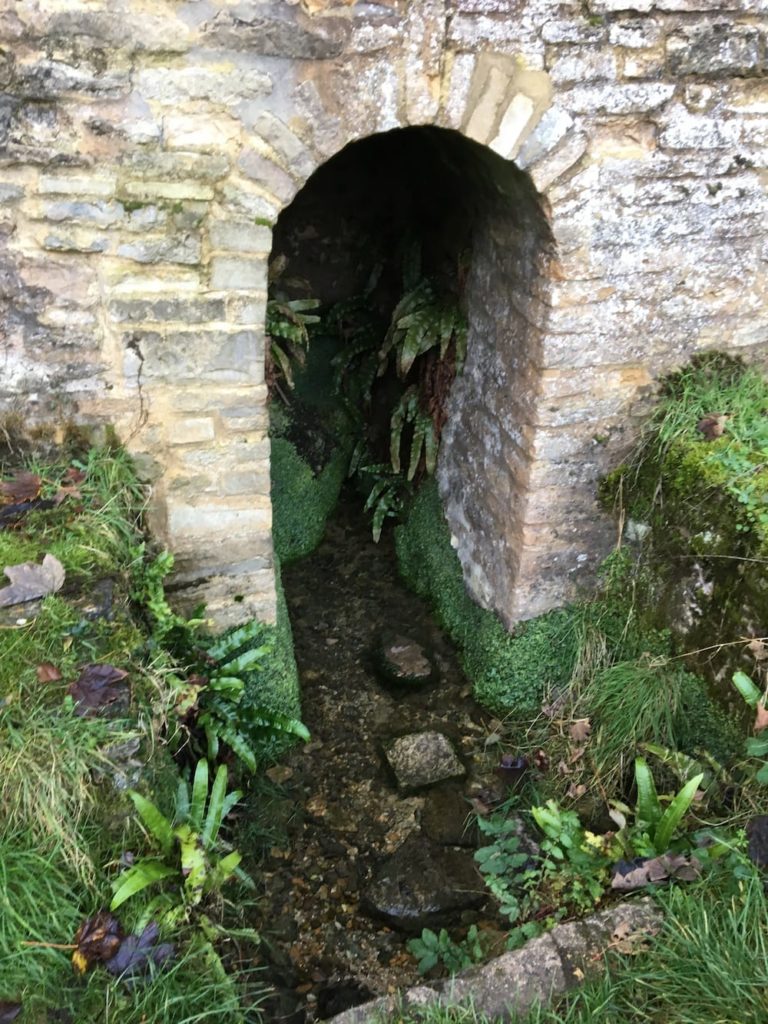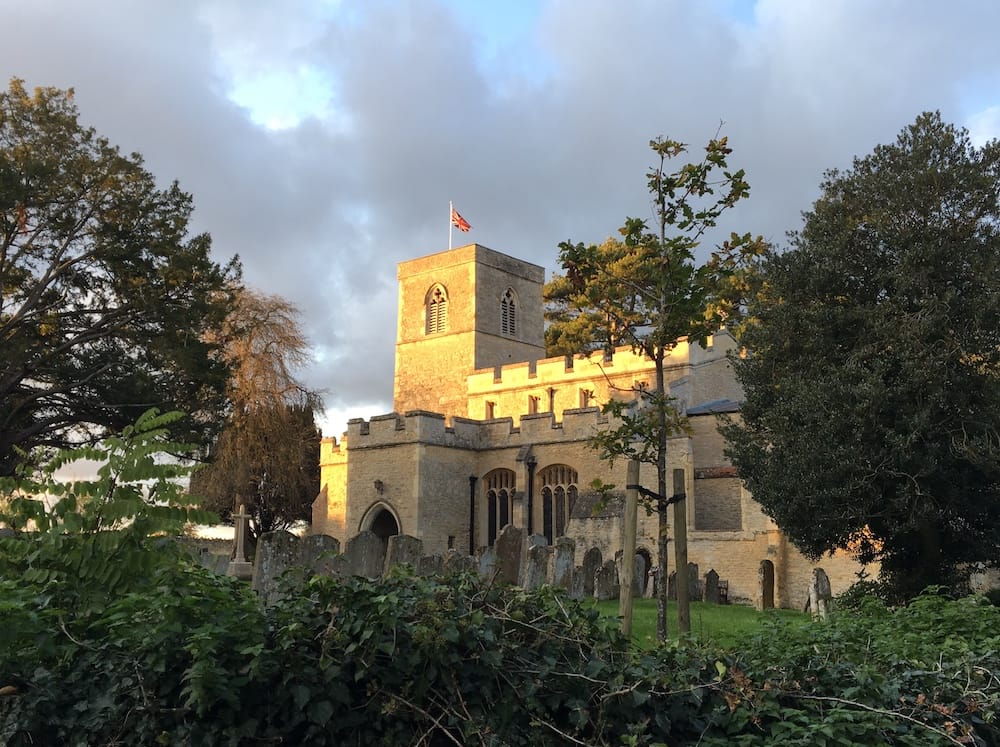Welcome to Season 3 of Nestless and Restless, as MLH* and I leave Nova Scotia, Canada, to travel again after an enjoyable summer and fall in Halifax.
This year’s Nestless and Restless is less about describing a trip by car, train or plane through a foreign country, and more about giving you a picture of a different type of journey: meandering in memory in England, where I grew up and where my family lives. Read on to discover more.
*My Lucky Half, aka my husband. I’m the other Lucky Half (equality – the name of the game when you are travelling).
It was fitting to write about my November trip to England on the day of the ‘Brexit’ General Election there (December 12th, 2019). As voters decided the future of the UK, I realized my visit a month before the election was infused with the debate, tensions, fears and frustrations of the political landscape. That turmoil is being stuffed into ballot boxes right now. I have no right to vote in the UK; I haven’t been resident there for 37 years, so my interest is a little detached. But I was brought up in England, most of my family lives there and I do consider myself British. I am an engaged observer.
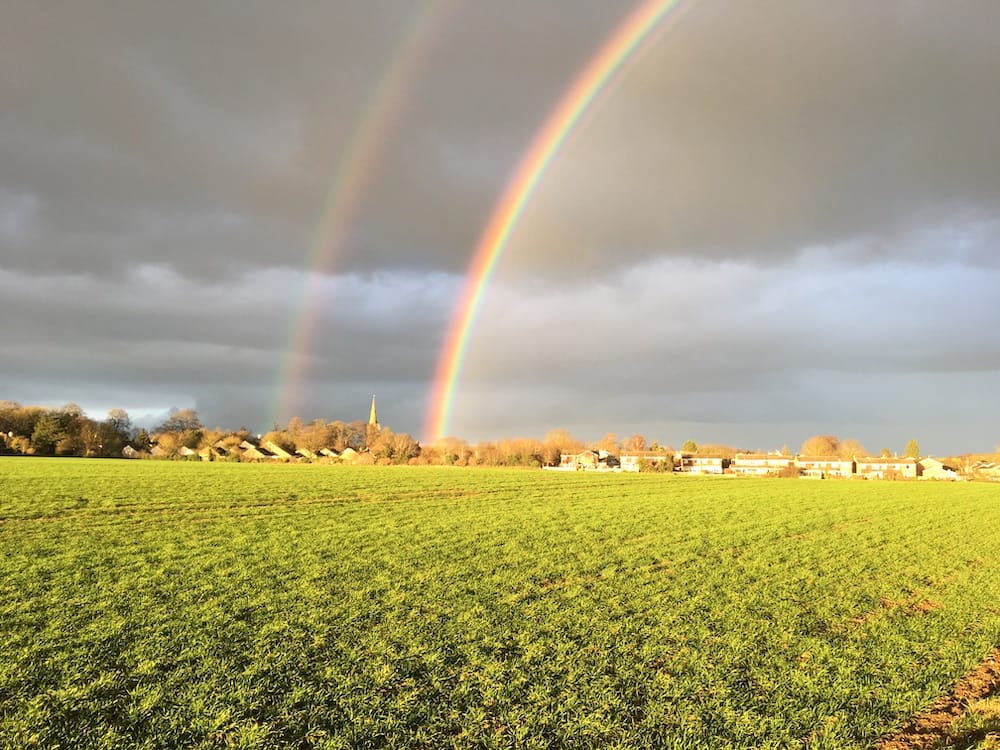
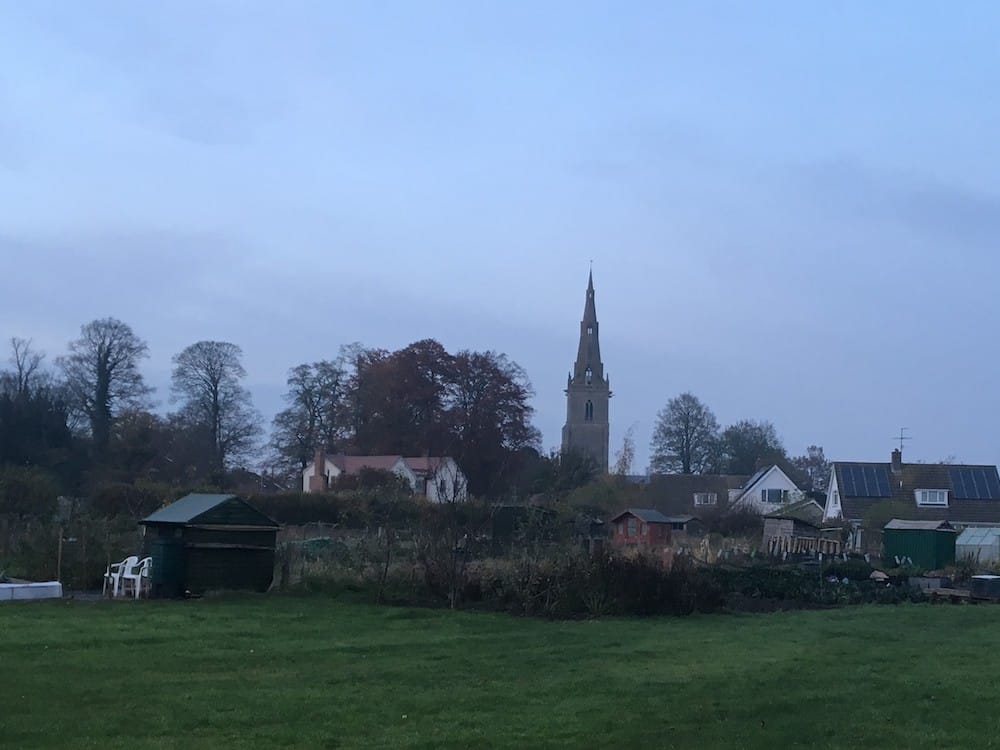
My parents live in a quintessentially English Saxon (5th-11th centuries) village of Sharnbrook in Bedfordshire, about 1.5 hours’ drive North of London and close to Cambridge. Past thatch-roofed wooden-beamed cottages and an old mill, the River Great Ouse (pronounced Ooze) flows with gusto through flat green pasturelands, fields of rapeseed, and magnificent stands of immense poplar trees. The land is low-lying and floods easily. The stone bridges over the river in the next village have level markers so residents can estimate when they will be cut off from the main road. Massive floods further to the West had caused a lot of damage in the days before my arrival, and the mood was apocalyptic. Prime Minister Boris Johnson on the campaign trail was getting ‘what-for’ from flood victims. The army reserves were called out. Eight people died.
On a bus into the town of Bedford, a retired shop assistant told me she was tired and confused by Brexit and the endless chaos. She didn’t trust any of the main parties and was going to vote Green, because they at least could be trusted to try and carry out their mandate. One of my sisters told me she had learned to avoid Brexit as a subject. It was too contentious. My other sister heard of dinner parties disintegrating into shouting matches with former friends going home in a huff. Young Europe-centric adults blame parents who voted Leave for the mess. A Belgian friend who works for the European Commission in Brussels described the uncertainty and unease pervading Europeans as they watch the EU wobble. Post Canadian Federal Election, the ‘Wexit’ separatist movement in Alberta and British Columbia borrows from Brexit. The debates and rips and ripples in developments and the news is as exhausting as filling endless sandbags to stop those rivers breaking their banks in the rain.
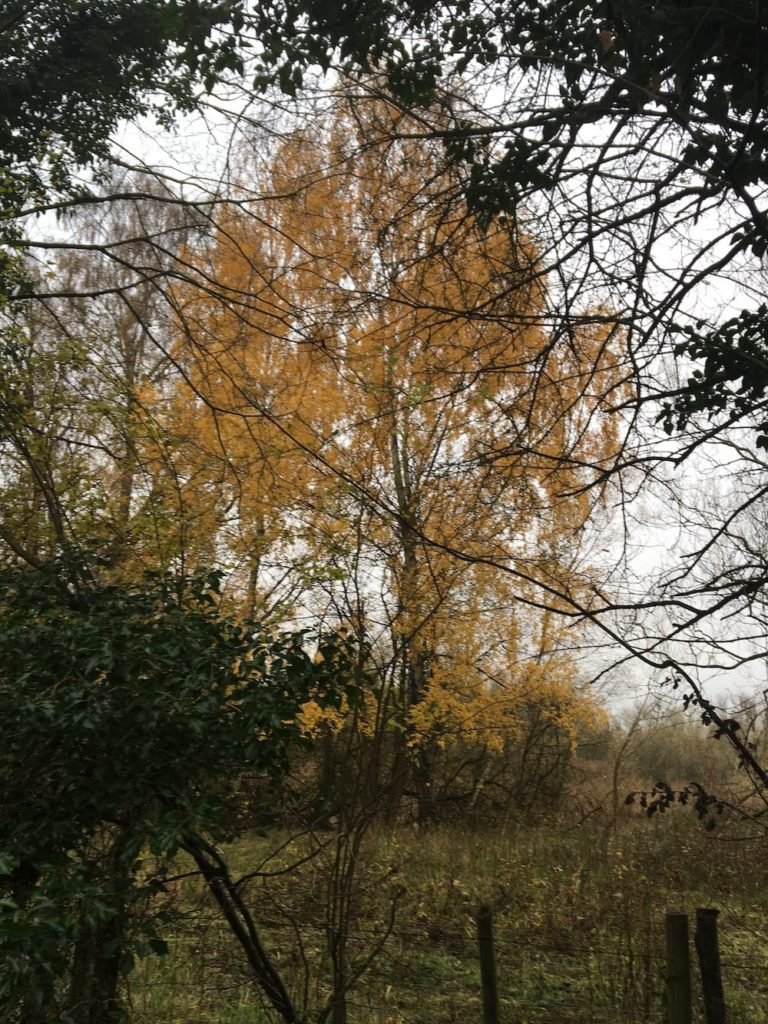
When nature is tired, it settles into Winter, and around me the autumn countryside was still and getting ready for quiet. With little frost or freezing and few maple trees, the English early Winter landscape is muted compared with the bright colours and sharp air of Canada. The dying leaves are a gentle yellow, and plenty of rain and dampness mean the hedges and fields are lush and green. Mist rises along the river and the air is soft. Carpets of fallen leaves and foliage under foot in the woods give off a smell of decay which could be off-putting, but which I love. It’s rich and earthy and full of the promise of renewal. England in November is wet and muddy, cloudy and grey. With sunset around 4 pm, the evenings seem impossibly long. The melodic British songbirds still herald nightfall, but they start about 3:30 pm. We drew the curtains and made toasted buttered crumpets and a pot of Earl Grey tea to prepare ourselves for the evening weather forecast and the ‘doom and gloom’ 6 o’clock News.
Remembrance Sunday was the day after I arrived in Sharnbrook. In the UK this is when the ceremonies take place. I helped my father pin his poppy and medals to his lapel and get ready to go to the cenotaph. My mother finds the day hard, so I stayed at home with her. A phone call from my sister to say she was thinking of us, and then we held hands as we listened to the BBC announcer describe the observances in London. November 11th is a working day in the UK, and I was in the supermarket when the shop manager read out the exhortation “They shall not grow old, as we that are left grow old” over the speaker system and the whole place became still at 11 am for two minutes’ silence. We stood, heads bowed, in the aisles wherever we happened to be; me in front of the Heinz baked beans. When I was a child policeman with the traditional Bobby helmets stopped all traffic. Buses, cars, pedestrians, everything, wherever they were, in even the middle of a roundabout, as the nation collectively remembered fallen service men and women. Then the supermarket muzak started again, and we all went back to filling our shopping trolleys.
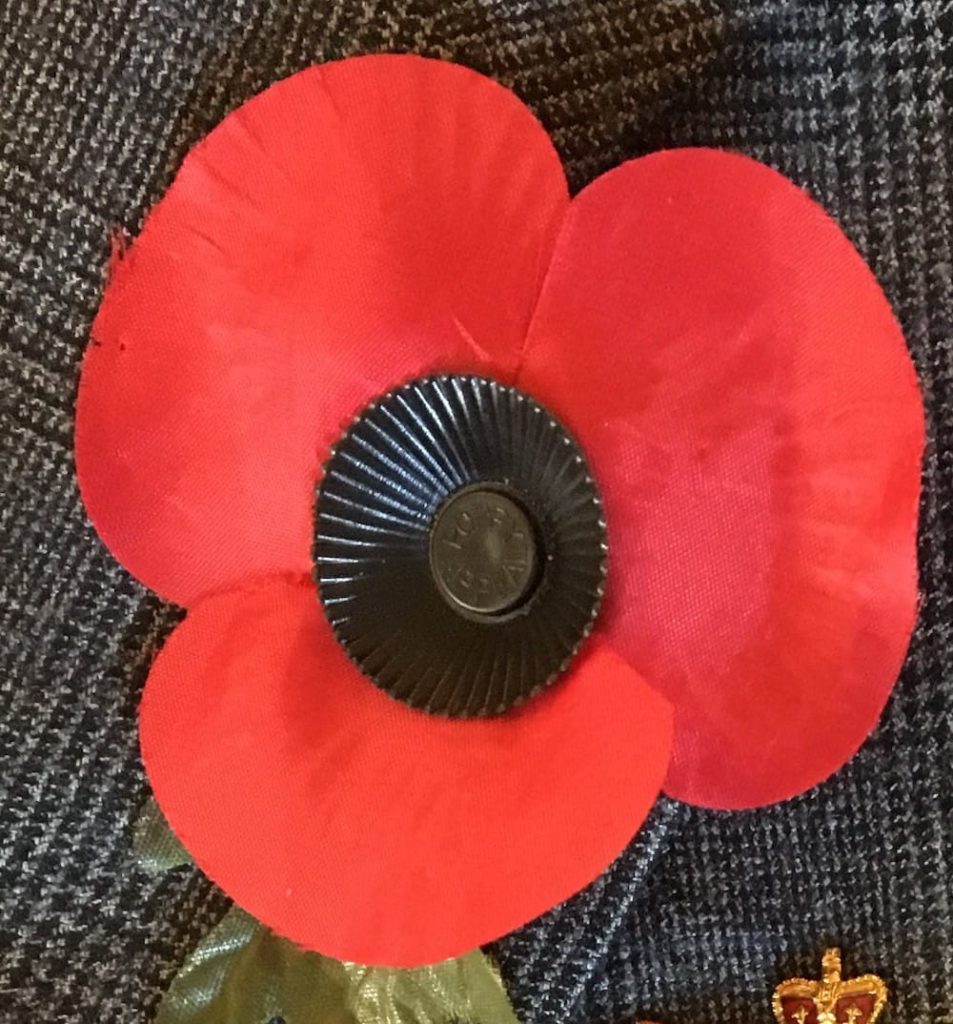
Mid-week we drove about 40 minutes North and West to the stone village of Fortheringhay in Northamptonshire, where Richard III was born, the Royal house of York was founded, Henry VIII had hundreds of monks praying day and night for his soul, and Elizabeth I had her rival Mary Queen of Scots beheaded and buried. The castle has gone, but the church is well-restored and is like a three-dimensional history book. The family crests of the Dukes and royals are in stained glass windows, and they colourfully trace the power struggles, alliances and betrayals of English rulers from the 12th to 17th centuries. I realized these traced my ‘O’ and ‘A’ Level history courses (Grade 10 and 12 national exams; also long consigned to history). The equally notable Falcon Pub was serving partridge pie and sticky toffee pudding, and so we had a good day out.
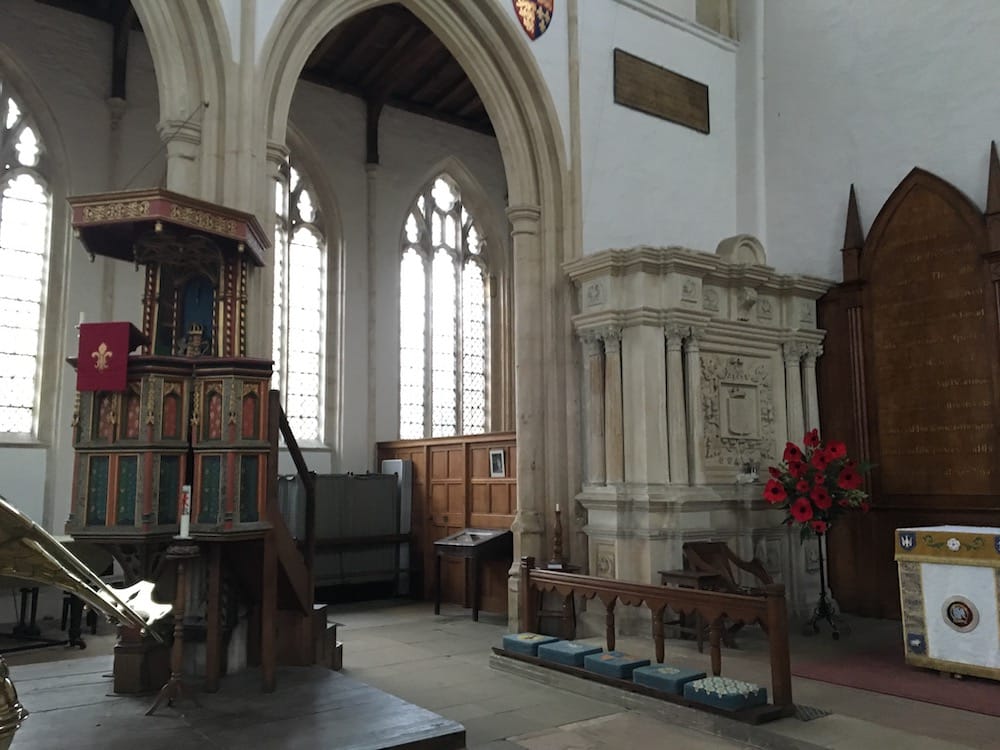
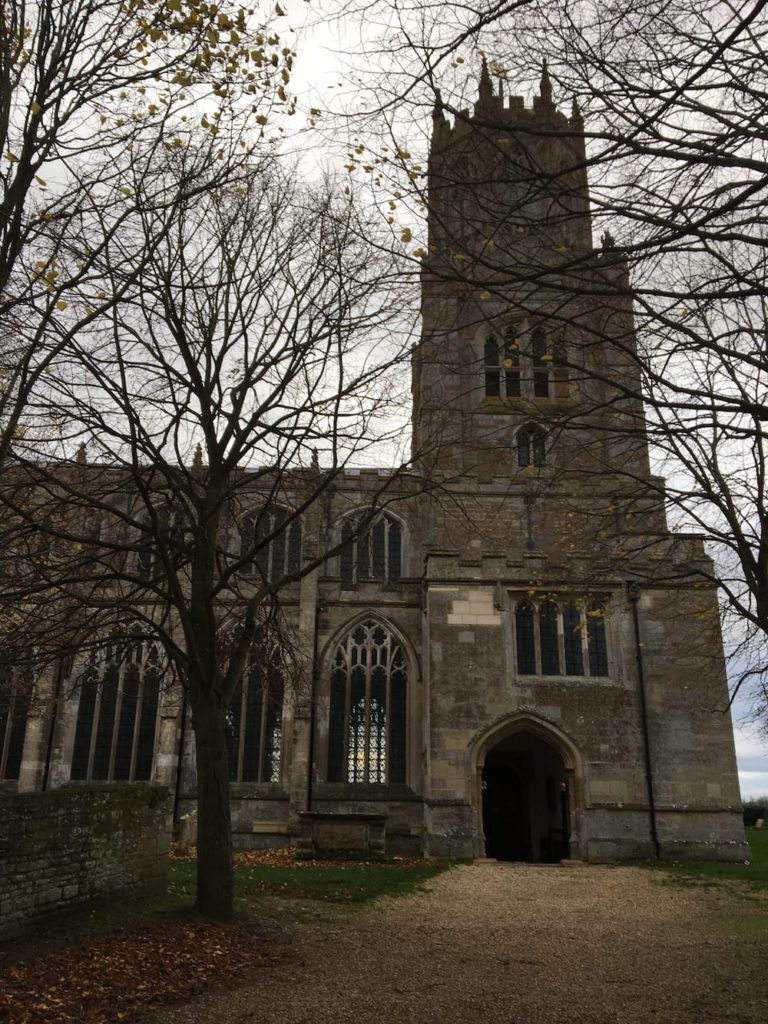
Closer to home on another outing we drove through neighbouring farming villages to see the old windmill at Stevington. I am very fond of English village names. Most Canadians are familiar with British town and city names because they were reused: Halifax, Bedford, Dartmouth, Chester, Liverpool, New Glasgow etc. However, I imagine you haven’t heard of St. Neotts, Souldrop, Odell or Turvey. My route to school when we lived in Cumbria was through a village named Stank, which thrilled me as a seven-year-old, particularly as there was a pig farm there and it did. In Stevington we found the mediaeval church of St. Mary the Virgin on the edge of the village rather than in the centre of it as is usual. They think this was a pagan holy site before the church was built. The holy well below the church, which by tradition has never frozen or gone dry, and whose waters are said to cure eye disease, certainly pre-dates Christianity. Around the well the succulent green leaves of the butterbur plant (it was used to wrap butter in) spread towards a walking path named Bunyan’s Way. John Bunyan, author of The Pilgrim’s Progress, was from this area. You almost expected the Pilgrim Christian, protagonist of this allegorical work, to appear striding down the path in his 17th century clothes. He would recognize the landscape and the church; I doubt it has changed much. St. Mary’s was bathed in gentle sunlight and it was quiet here, with only the clack of farm tractors on the narrow road, and the odd villager calling their dog to heel. My father told me that a while ago the local government planned to route the main road right through the village instead of building a by-pass road. Petitions and protests didn’t work. Then local farmers decided to drive their farm vehicles – all of them – round and around the village during morning and afternoon rush hour very, very slowly. Commuters sat for hours in their cars. The local authority built the by-pass.
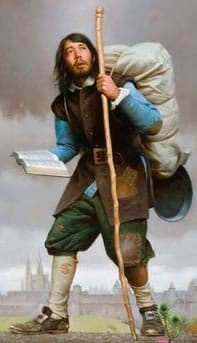
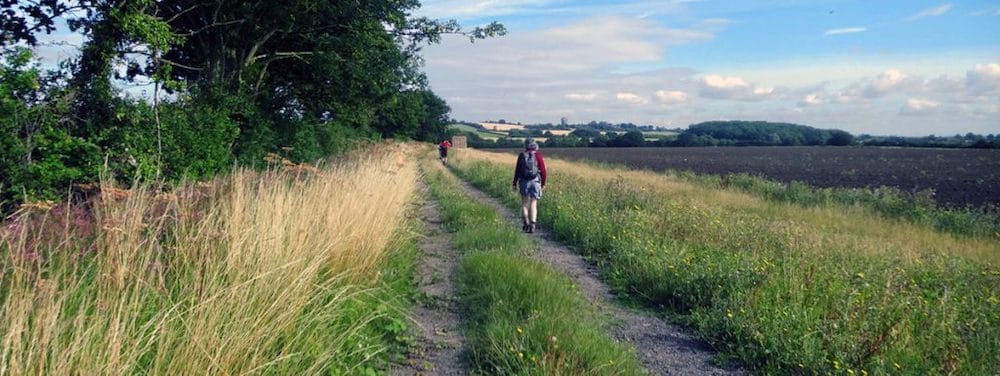
Maybe it was that English stamina and fortitude rooted in the land which led to the Conservative win on December 12th. Or perhaps Boris Johnson read the public mood on Brexit and gambled correctly. In either case, as I finished writing this, the British people gave him a mandate to ‘get Brexit done’. The deep layers of soil in the East of England contain Viking, Roman and Saxon bones. Rulers, alliances and unions wax and wane. In the end Brexit and possibly the union of England, Scotland, Wales and Northern Ireland is one more layer to be composted back into the earth and contained in future cycles. At least people can concentrate on preparing for Christmas and the New Year now. It was certainly on my mind as I hunted for presents and made sure I tasted all my favourite English food before heading back across the Atlantic. The first stop on my culinary quest had to be The Hill Farm Shop.
